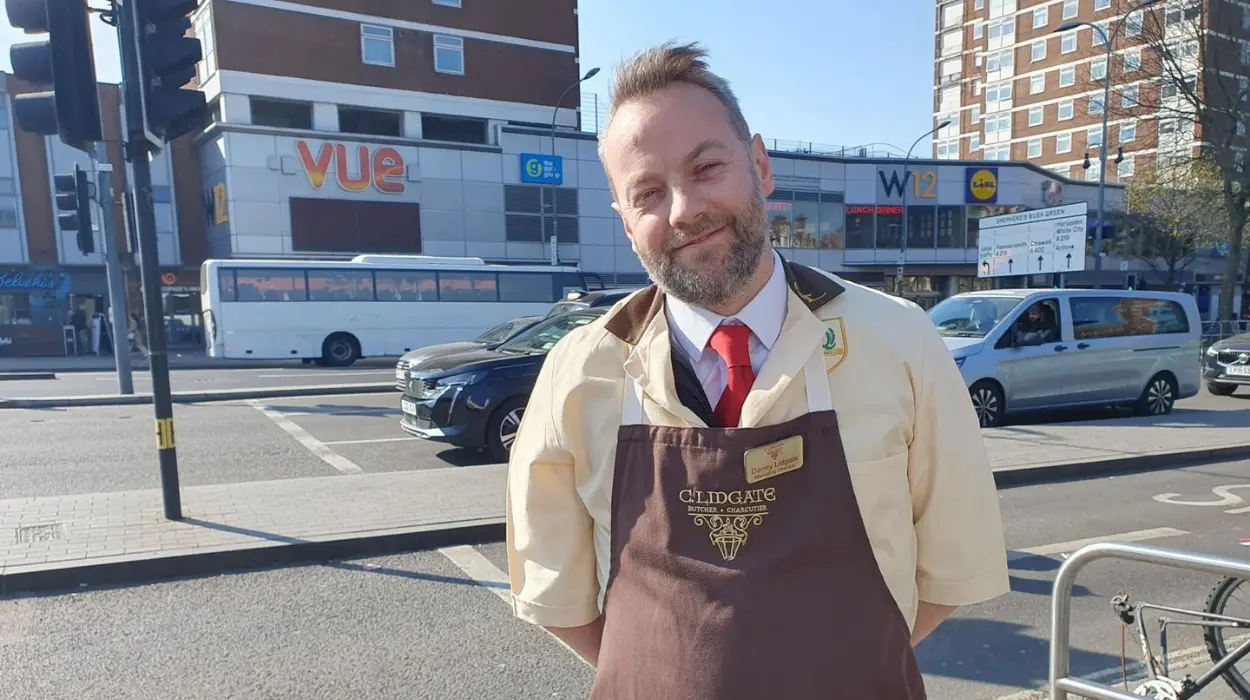Hammersmith and Fulham (Parliament Politics Magazine) – A 175-year-old butchers in Hammersmith warns that a new cycleway at Holland Park Roundabout will increase congestion and threaten local businesses and jobs.
Businesses are already dealing with a difficult working environment, according to Danny Lidgate, 45, Managing Director of C Lidgate on Holland Park Avenue, “and what we need is a bit of help, not further challenges.”
The roundabout is one of the most hazardous on the city’s road system, according to Helen Cansick, Head of Healthy Streets Investment Planning at Transport for London.
The modifications “have been carefully designed to tackle road danger while enabling everyone to travel through the area efficiently.”
A two-way protected bike lane will be constructed on the south side of the roundabout from Shepherd’s Bush Green to Holland Park Avenue as part of the Transport for London (TfL) project.
Along with upgrades to the crossing outside Shepherd’s Bush station, more environmentally friendly drainage, and greening, there are plans to construct another segment of priority bus lane.
However, the proposals have raised concerns, mostly because of worries about how they will affect traffic and pollution. Felicity Buchan, a former Conservative MP for Kensington, organized a petition against the works, and 2,720 people signed it.
Small businesses fear that less accessibility could negatively impact their operations and viability, particularly those that depend on foot traffic and convenient access for deliveries.
If local companies find it difficult to retain their clientele and operational effectiveness, the possible economic impact on them may result in job losses.
To make sure that any infrastructure modifications balance the demands of bikes, vehicles, and nearby businesses, there may be calls for greater community involvement and consultation.
Andrew Boff, the chair of the Conservative London Assembly, joined a group of locals and business owners in protesting the scheduled construction on Thursday morning.
He said:
“It will result in more congestion and more pollution coming from idling traffic.
Ironically, bearing in mind the motive behind this scheme is to improve the cycling experience, it actually becomes more dangerous for cyclists. It creates more blind spots, and creates conflict between cyclists and motorists when there shouldn’t be any.”
According to Mr. Lidgate, who is also the chair of the Holland Park Traders Association, 10% of his clients drive, and they account for 25% of total spending.
He said:
“If we lose those 10 per cent because they can’t come because of congestion, and they just change their shopping habits and order online or use Ocado, that’ll close businesses and lose jobs.”
According to TfL, a consultation conducted last year showed that most participants believed the improvements would encourage more bicycling and walking in the area.
Local governments and companies should collaborate closely on infrastructure projects like cycleways to reduce potential negative effects like increased traffic. This could entail offering alternate entry points for delivery or modifying traffic control tactics.
Building trust between local authorities and businesses can be achieved by providing clear and convenient avenues for businesses to raise complaints or concerns.
Ms Cansick said:
“We always take congestion, including any impact on bus journey times and air quality, into careful consideration when designing schemes.
Our detailed traffic modelling has shown that any traffic impacts are expected to be minimal. We value feedback from residents and businesses and continue to engage with the community as we move forwards.”
The following phases entail TfL collaborating with Hammersmith and Fulham Council, the local authority, to develop a comprehensive design. Prior to construction, additional interaction is scheduled for later this year.
What measures are being taken to address concerns from local businesses in Hammersmith and Fulham?
To learn about the needs and problems of businesses, local governments can hold town hall meetings, advisory panels, or surveys. This candid discussion aids in the development of laws that promote regional business.
Local hubs that allow companies to network and share ideas can be set up by governments. They can also improve access to main street businesses and offer free advertising possibilities.
Small firms can experience less financial strain if business rates are lowered and capital becomes more accessible. To help local businesses, governments might provide subsidies and small business loans.
Simplifying licensing procedures and maintaining open governance might make it easier for companies to comply with regulations.


